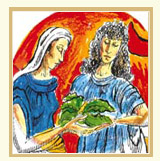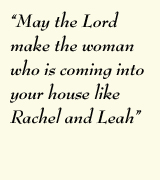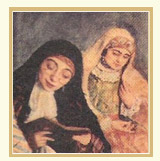Leah and Rachel
“May the Lord make the woman who is coming into your house like Rachel and Leah, both of whom built up the House of Israel!” (Ruth 4:11) In this dramatic testimonial, found at the conclusion of the Book of Ruth, Jacob’s wives are singled out as the founding mothers of Israel. Between the two of them and their handmaidens (dig deeper) they mothered the twelve sons that became the tribes of the Israelite nation. However, the private lives of Rachel and Leah were far from simple. Their story from the outset revolved around Jacob.[1]Bilhah was the handmaiden of Rachel and Zilpah was the handmaiden of Leah. Plagued by her barrenness, Rachel gave Bilhah to Jacob to bear children. Bilhah mothered Dan and Naftali. Leah similarly gave Zilpah as a concubine to Jacob and she mothered Gad and Asher. In some sources Jacobs concubines are included as Matriarchs making the number of founding mothers six: cf. And they brought their offering before the Lord, six covered wagons Six corresponding to the six Matriarchs – Sarah, Rebecca, Rachel , Leah, Zilpah and Bilhah. Bamidbar Rabbah 12:17. See Alvan Kaunfer, “Who Knows Four? “The Imahot in Rabbinic Judaism”, Judaism 44(1995) pp. 94-103
Out of concern for Jacob’s physical welfare as well as his future as the bearer of the covenant, his mother Rebecca sent him to her family in Haran, to find a wife. Upon arrival he providentially happened upon a beautiful young shepherdess who turned out to be his cousin Rachel. He was immediately taken by her, and asked Laban for her hand in marriage. The text describes the negotiations as follows:
When he had stayed with him a month’s time, Laban said to Jacob, “Just because you are a kinsman, should you serve me for nothing? Tell me, what shall your wages be?” Now Laban had two daughters; the name of the older one was Leah, and the name of the younger was Rachel. Leah had weak eyes; Rachel was shapely and beautiful. Jacob loved Rachel; so he answered, “I will serve you seven years for your younger daughter Rachel.” Laban said, “Better that I give her to you than that I should give her to an outsider. Stay with me.” So Jacob served seven years for Rachel and they seemed to him but a few days because of his love for her. Then Jacob said to Laban, “Give me my wife, for my time is fulfilled, that I may cohabit with her.” And Laban gathered all the people of the place and made a feast. When evening came, he took his daughter Leah and brought her to him; and he cohabited with her. Laban had given his maidservant Zilpah to his daughter Leah as her maid. When morning came, there was Leah! So he said to Laban, “What is this you have done to me? I was in your service for Rachel! Why did you deceive me? Laban said, “It is not the practice in our place to marry off the younger before the older. Wait until the bridal week of this one is over and we will give you that one too, provided you serve me another seven years. Jacob did so he waited out the bridal week of the one, and then he gave him his daughter Rachel as wife. Laban had given his maid servant Bilhah to his daughter Rachel as her maid. And Jacob cohabited with Rachel also; indeed, he loved Rachel more than Leah. And he served him another seven years.
(Gen. 29:14-).
The biblical narrative highlights Jacob’s ardent love for Rachel. His years of perseverance and hard labor are a testimony to the bond between them. The narrative silences leave the reader to imagine Jacob’s dismay at being saddled with Leah. Rachel and Leah do not voice their intense feelings at this juncture, but rather later in the story.



References
| ↑1 | Bilhah was the handmaiden of Rachel and Zilpah was the handmaiden of Leah. Plagued by her barrenness, Rachel gave Bilhah to Jacob to bear children. Bilhah mothered Dan and Naftali. Leah similarly gave Zilpah as a concubine to Jacob and she mothered Gad and Asher. In some sources Jacobs concubines are included as Matriarchs making the number of founding mothers six: cf. And they brought their offering before the Lord, six covered wagons Six corresponding to the six Matriarchs – Sarah, Rebecca, Rachel , Leah, Zilpah and Bilhah. Bamidbar Rabbah 12:17. See Alvan Kaunfer, “Who Knows Four? “The Imahot in Rabbinic Judaism”, Judaism 44(1995) pp. 94-103 |
|---|